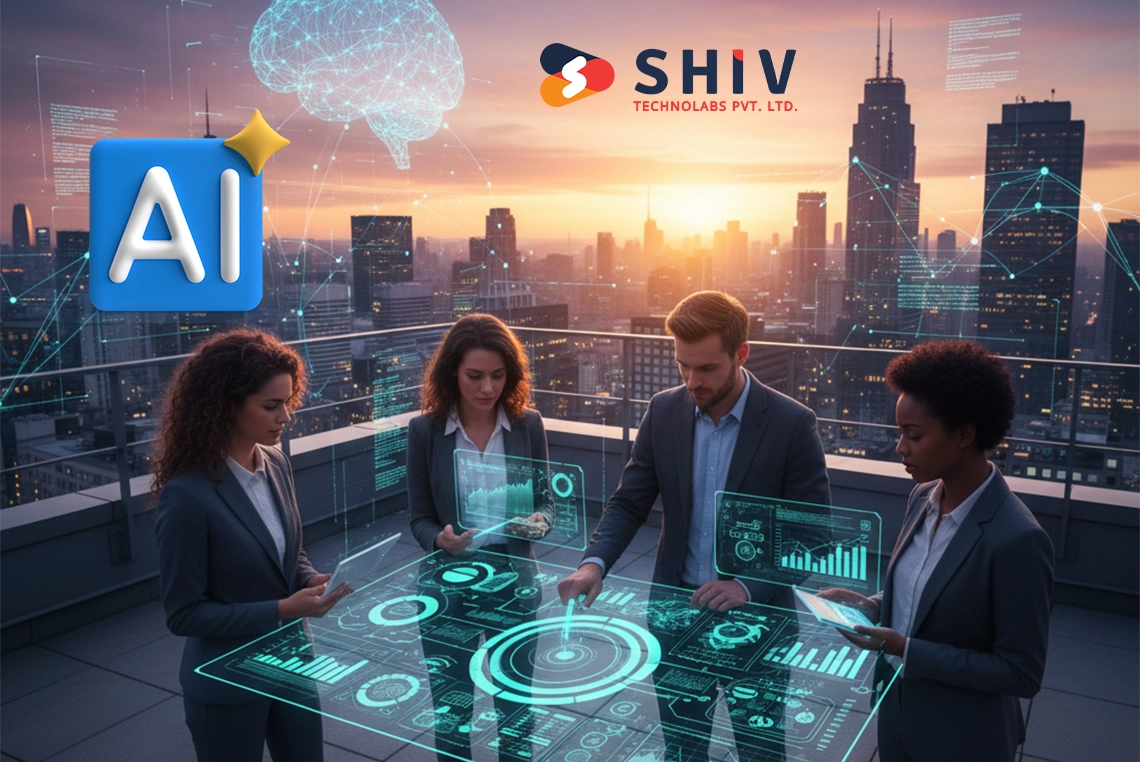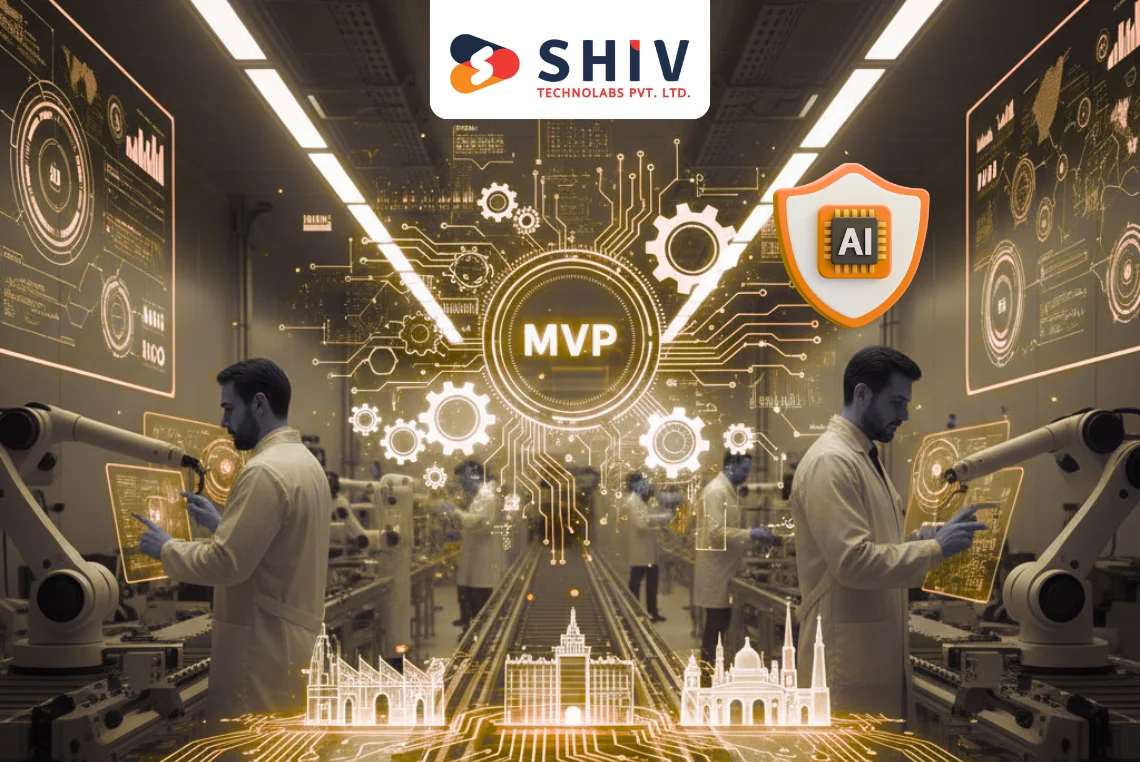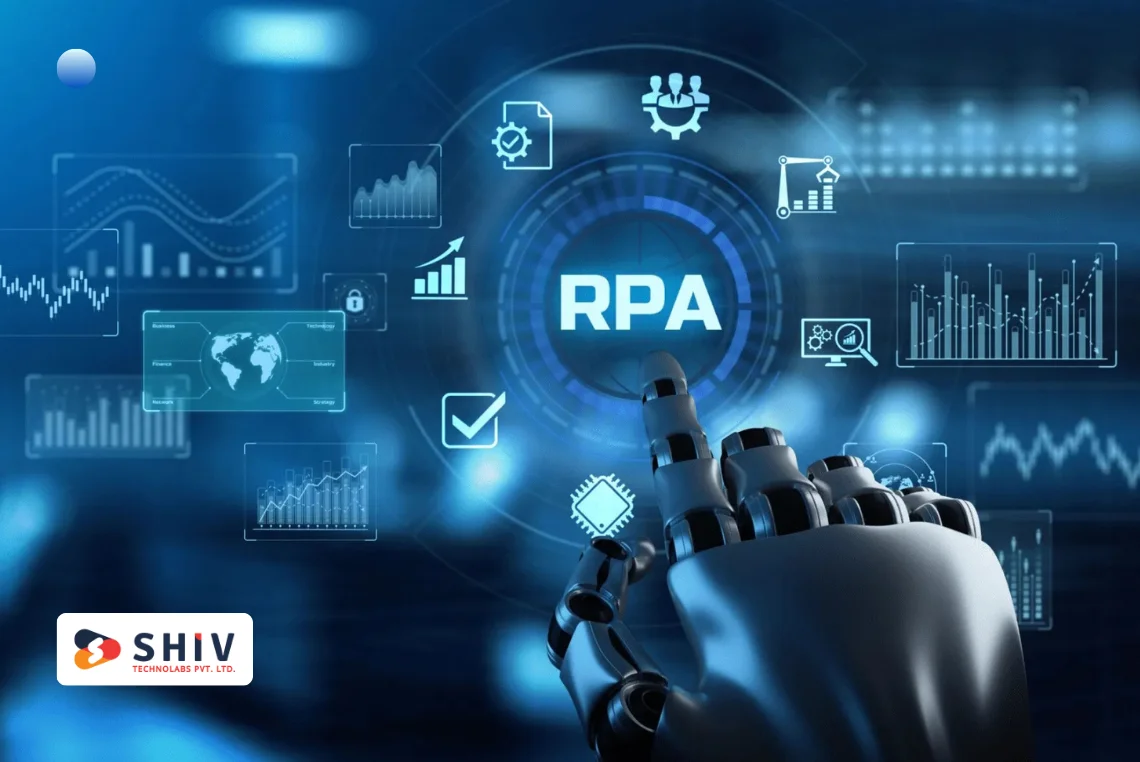Table of Contents
Imagine your business operating on autopilot, with activities that used to take hours now completed in minutes, real-time decision-making, and groups no longer occupied with daily routine so they can focus on strategy. It is what collaborating with a long-time provider of AI agent development services will do.
Very simply put, a business AI agent is an artificial person, a computer program that listens, analyzes, and takes actions on behalf of your business. It is trending because manual processes stifle growth as companies grow; automation is the differentiator.
Apply it to something as external as customer support ticket triage or as internal as workflow automation, and you instantly have speed, reduced manual load, and smarter decisions. This is being realised by companies.
One survey found that 78% of organisations now have at least one business operation utilising AI. In this article, we will deconstruct what a business AI agent is, what it does, and how companies implement autonomous AI agents to run their businesses.
What Does a Business AI Agent Do Inside a Company?
If you are wondering what an agent of business artificial intelligence does within an organisation, we shall visualise the roles and functions.
A business AI agent is not just a chatbot, but a multi-purpose device capable of tracking workflows, communicating with systems asynchronously via APIs, and executing actions without human involvement (or with minimal involvement). It belongs to a wider effort of automating a business process.
Example tasks an AI agent performs
- Response to customers and ticket forwarding.
- CRM updates and Lead qualification.
- Inventory and order triggers workflow.
- Drafting emails and a schedule.
- Knowledge assistant within the company.
- Reporting & data fetching
- Workflow approval and form filling.
In both of these activities, your business is automated, enabling speed and real-time responsiveness. A company such as this is precisely the kind of agent companies request when they demand custom artificial intelligence automation.
How Do Companies Use Autonomous AI Agents to Scale?
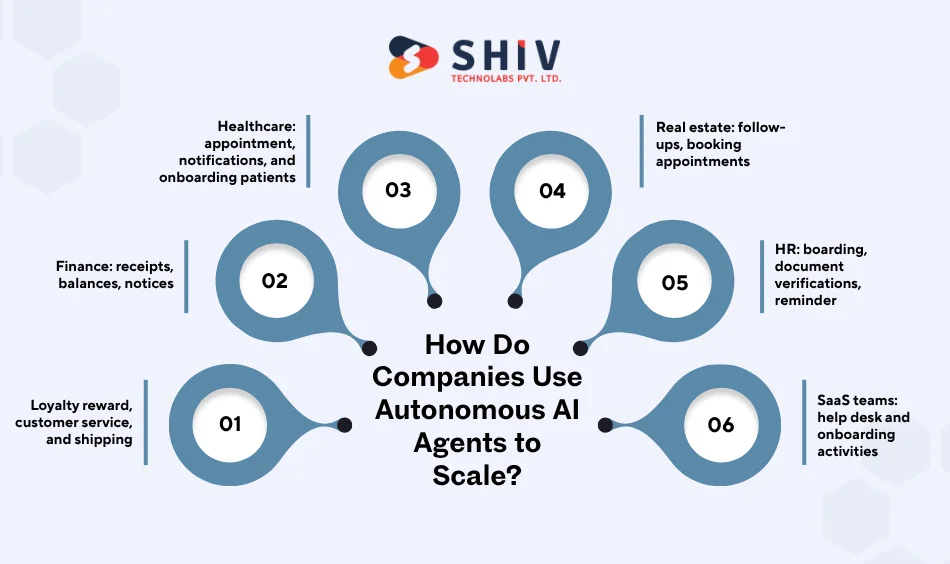
When companies consider how autonomous AI is used in businesses, the picture is even more precise: the agents operate without human instructions or are barely controlled at all, which enables them to do things at scale. The following are the application areas of autonomous ai agents in business by industry.
Loyalty reward, customer service, and shipping
Customer queries are handled by agents, returns are automated, order tracking is performed, alerts are sent, and stock is rerouted.
Finance: receipts, balances, notices
Invoices are read by agents, payments are matched, books are reconciled, anomalies or due receivables alerts are sent.
Healthcare: appointment, notifications, and onboarding patients
Agents make appointments, send notifications, gather intake data, and forward concerns to human staff as needed.
Real estate: follow-ups, booking appointments
The agents call out to prospects, screen leads according to the criteria, secure a viewing slot, and follow up automatically.
HR: boarding, document verifications, reminder
The agents receive new hire forms, check documents, organize orientation sessions, remind the employee and the manager of any outstanding tasks.
SaaS teams: help desk and onboarding activities
Agents guide new users during setup, answer common helpdesk support, report bugs to engineers, and initiate in-product notifications.
These demonstrate that the way AI agents are enhanced to help businesses work better is not futuristic but feasible.
What’s the Difference Between an AI Agent and a Chatbot?
Chatbots and AI agents are often used interchangeably when there is a significant difference between these two elements. The following table elucidates the distinction between ai agent and chatbot among the business users.
| Feature | AI Agents | Chatbots |
|---|---|---|
| Core function | Handles tasks & actions (workflow, APIs etc) | Text replies only |
| Decision logic | Autonomous, adaptive | Scripted & rule-based |
| Tool usage | Can operate apps, APIs, systems | Mostly stays within chat interface |
| Complexity level | Multi-step workflows, integration | Limited to Q&A or guided conversation |
Do AI Agents Replace Staff or Support Them?
First, it is important to clarify that the question of whether AI agents replace staff or support them is key to buy-in and culture. The answer: they support them. They liberate humans from routine so they can concentrate on high-value work. They do not exist to eliminate human judgment entirely.
AI agents assist, don’t replace entire teams
AI agents take the monotony out of the duties of staff, such as data entry, basic responses, and automatic routing. The human team is still retained in tasks that are complex, creative, heavy in strategy and judgment.
Remove repetitive tasks, let people focus on high-value work
Human beings are able to think critically and make relationship and strategic decisions when the mundane is left to the agents. The hybrid model of the human + AI collaboration model is that.
Human + AI partnership model
The most effective companies use agents to assist employees: they are used to gather data, uncover information, perform ordinary chores, and human beings review results, refine them, plan, and empathize. It is a complement and not a replacement.
Tasks humans still do:
- Pricing strategy (judgement-based decisions), contract negotiation.
- Artistic work (brand story, campaign creation)
- Difficult problem solving (escalations, unique issues)
- Relationship management (sales calls, communication to stakeholders)
What Are the Advantages of Using AI Agents in Business Workflows?
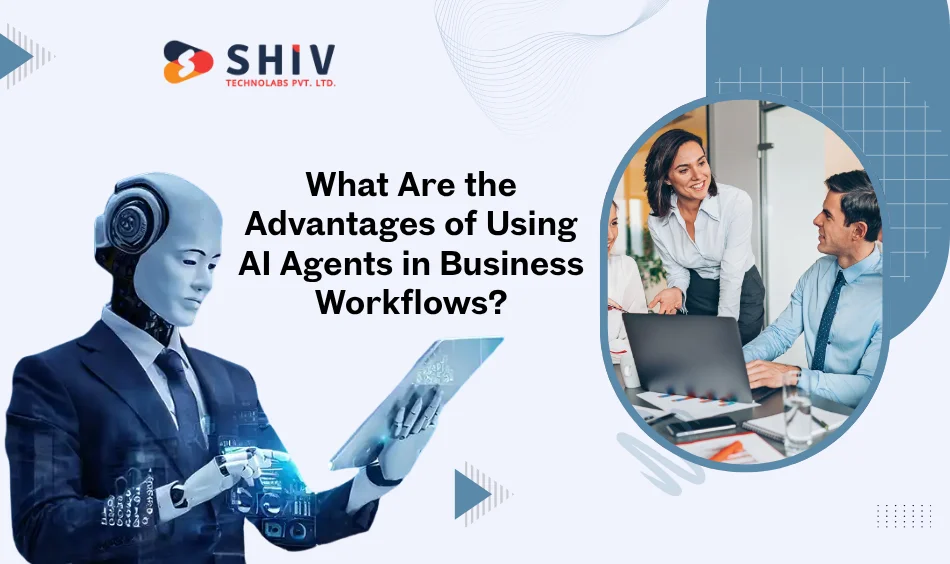
When you consider the benefits of the way the ai agents elevate the operations of the business, the advantages are obvious. The benefits justify investing in purpose-built automation and process alignment.
- Faster execution: What could take hours is accomplished in seconds or minutes. Agents cause behaviors as soon as they qualify- speed is the driver of responsiveness and a competitive advantage.
- Lower workload & cost: Fewer human hours are required with automated manipulation of routine activities. That decreases labour costs and enables resource reallocation. Automating the business processes through agents allows you to grow without a proportional rise in costs.
- Fewer manual mistakes: When tasks, data transfers, and form filling are repeated, humans make errors. Agents are consistent and reliable, minimizing the risk of errors and enhancing compliance and accuracy.
- 24/7 task execution: Agents don’t sleep. They can oversee systems, respond to incidents during off-hours, send notifications, and act anywhere in the world. That enhances up-time and responsiveness, which is particularly needed by global teams or 24/7 operations.
- Better customer experience: Fewer errors, quicker reaction, proactive arrives. The difference can be felt by customers. Agents facilitate uniform quality and faster resolution of issues which facilitates retention and brand image.
Also Read: Artificial Intelligence for Customer Experience
- Scales without extra hiring: Growth in volume does not require growth in staffing. Agents take in normal capacity. That facilitates efficient scaling and is the focus of a business growth strategy.
How Much Does It Cost to Build a Custom AI Agent for Business?
When considering investment in custom automation solutions of AI, you will be interested in the cost considerations and specifications. Below is a breakdown to help.
Cost factors
- Complexity: The more difficult the workflows, the more AI logic, integrations, exceptions, and learning loops.
- Workflow count: Single workflow is less expensive; multi-department workflows are more expensive.
- Integration requirements: Interconnection of CRMs, ERPs, internal databases, third-party APIs attracts cost.
- Data model + training: When your agent uses machine learning or big data, the development of the model, data cleaning, and training become costs.
- Continuing maintenance: Agents do not build once and leave behind. They need to be monitored, tuned, governed, and data-driven.
Cost expectation
| Type | Features | Estimated Range |
|---|---|---|
| Basic agent | One workflow, simple logic | $10,000 – 50,000 |
| Mid-level agent | Multi-tool, data logic, some learning | $50,000 – 250,000 |
| Enterprise multi-agent | Cross-department automation, AI-models | $250,000+ |
When Should a Business Consider Using AI Agents?
It is not now or never, but you need to take agents seriously when some metrics or signals are observed. Here’s your checklist.
Use AI when:
- Monotonous job takes over time – in case the staff are consuming hours in repetitive processing.
- Team workload is increasing – work is becoming more than human beings can handle.
- Support tickets and leads proliferate out of control, handlers are unable to cope, and delays occur.
- Accuracy is required in the process – mistakes are frequent, and compliance is high quality.
- You need quicker customer service responses; waiting time damages your reputation or conversion rates.
- Several tools must be synchronized, data silos, hand-offs, and inefficiencies.
When a few of them fit your company, it is time to consider an AI agent project. And then it is important to hire an experienced AI agent development company.
What Should You Look for in a Partner to Build AI Automation?
Choosing the right partner is important, and a generic software house will not do the trick in case you aspire to get some value out of the custom-made AI automation solutions. Here are the key criteria.
- Real experience of AI implementations: Identify those companies that have developed and implemented agents (not merely chatbots) and can present case studies of how this has been implemented into workflow in real business environments.
- Understanding of business workflows: The partner should not only code and deliver but also understand your business processes, pain points, and goals. Domain knowledge is key.
- Security & data handling: Agents will be able to access systems and data and select partners with strong protocols, governance, privacy, and compliance policies.
- Scalability planning: Your agent must be built to expand, more workflows, geographies, integrations. Ask how scaling is managed.
- Ongoing support & updates: Agents require training, observation, and realignment. A partner must provide after-launch support, analytics, cycle of improvement.
- Ability to tailor: Avoid cookie-cutter solutions. Your business is not standardized, so it needs custom architecture rather than off-the-shelf modules.
When you select someone with those abilities, you are guaranteed returns on your investment in automation.
Conclusion
The next level of workforce is Business AI agents. They do not substitute teams; they complement them, make them work harder, enable companies to serve more and smarter, and they grow at a faster pace.
When you are willing to streamline workflows, automate processes, and enhance decision-making accuracy, you can only clear the way to the goal by starting now with pilot projects. At Shiv Technolabs, we specialize in AI agent development services that deliver real-world business process automation for companies ready to transform.
Together with deep technical skills and workflow-based design, and custom solutions, as a trusted AI agent development company, we bring together the expertise to make you successful. Let’s connect today and turn your concept into a high-impact agent solution customized for your business.
FAQs
What tasks can a business AI agent manage daily?
Examples of routine tasks that an agent AI can address include routing ticket, qualifying leads, data entry, form approvals, scheduling and report generation. These are solutions of a team that has experience on business process automation and development of custom AI agents.
How do autonomous AI agents work in real workflows?
Autonomous AI agents observe triggers (e.g., the arrival of new leads), perform actions (e.g., updating the CRM, sending emails), utilise tools (e.g., connecting to APIs and databases), and escalate. Organisations developing autonomous AI agents to do business design them to be reliable and valuable.
Are AI agents superior to chatbot support and work?
Yes, chatbots are more effective in the text-only format, but AI agents go further: they behave, interact with systems, and perform multi-step processes. An agent is more intelligent than a button in case you require the actual execution of tasks and their automation.
What is the approximate time to create a custom AI-based agent?
Timeframes differ: simple agents can be developed in a couple of weeks, whereas mid-level or enterprise multi-agent systems usually require months. The development of AI agents will be done by a specialised company that will map the workflow, integrations, and roll-out in phases.
Is it possible for small companies to afford AI agents, or is it just for enterprises?
Small businesses can surely do well. Numerous organisations have growth-oriented scaled pilots and mid-level agents. With bespoke AI automation solutions, you can select workflows that provide value today and grow over time, and they are even financially feasible on small budgets.





